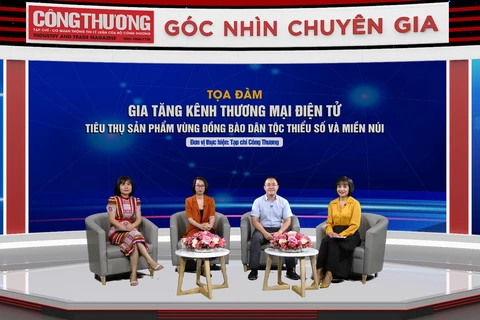Hanoi (VNS/VNA) - Small scale, limited production level and operation capacity are barriers that create difficulties in deploying sales of businesses and cooperatives in localities on digital platforms.
Along with that, logistics infrastructure, transportation and delivery costs account for a large proportion, from 20-30%, sometimes even up to 40%, which is also creating considerable pressure in bringing agricultural products to the e-commerce floors.
Cooperatives have focused on production, trying to create products that meet the quality standards in recent times, but have not really invested in human resources for the development of e-commerce, according to Vu Quang Phong, Director of the Trade and Investment Promotion Centre under the Vietnam Cooperative Alliance.
Meanwhile, this is an inevitable trend in the digital transformation process that is strongly promoted by a segment of young consumers, but there is still a relatively large gap for the elderly who have not kept up with the pace of technology development.
Phong said that competition on e-commerce platforms is inevitable. However, due to many difficulties in scale and capital, cooperatives do not know how to invest in human resources and build marketing and advertising campaigns, so they need systematic support.
Cooperatives and farmers need to have an innovative mindset to be able to take full advantage of the benefits of e-commerce.
Doing business through e-commerce platforms does not just stop at harvesting and selling, but requires investment in packaging, logistics, transportation or making promotional images to improve methods of production and develop business in an optimal way.
Although online business was no longer unfamiliar, in reality, for production, business establishments, and farmers, to bring agricultural products to e-commerce platforms was still very small and modest, said Bui Huy Hoang, Deputy Director of the Centre for Information and Digital Technology of the Vietnam e-Commerce and Digital Economy Agency (iDEA) under the Ministry of Industry and Trade (MoIT).
According to Hoang, difficulties come from limited awareness and resources of businesses for this business method. Most businesses and cooperatives producing and trading agricultural products still lack human resources knowledgeable about information technology, sales processes, and marketing.
Besides, registering a store and posting products on e-commerce stores is something businesses can do. However, in order for products to reach consumers, businesses need to be properly guided and trained on how to promote online, build product images and implement product packaging and preservation processes, or customer care methods, after-sales services.
As one of the provinces and cities with a high e-commerce index, the Cuu Long (Mekong) Delta city of Can Tho technology trading floor has become one of the useful information channels for searching and offering products for businesses and cooperatives in the area.
In particular, the city has supported and guided hundreds of businesses and cooperatives to participate in online trading platforms such as Tiki, Lazada, Voso, Sendo, Shopee, Postmart.vn to promote agricultural and rural digital economy; organise training for businesses, cooperatives, production and business establishments, and households to bring products to e-commerce platforms.
Up to now, many provincial OCOP products have been supported and guided to be listed on major e-commerce platforms.
However, according to representatives of cooperatives, with large-scale sources of agricultural products, cooperatives are supplying traders and distribution systems, but do not know how to start on e-commerce platforms.
A representative of the Can Tho City Cooperative Alliance said that the connection and consumption of goods between manufacturers, farmers and distributors only took place through traditional methods before.
Furthermore, most cooperatives only produce and farm mainly on a small scale, lacking the connection to create key products. It is the technical barriers, regulations, and product standards that make linking and connecting to consume goods difficult, according to the representative.
Similarly, representatives of a number of cooperatives and cooperative groups in the Mekong Delta province of Dong Thap also said that although they had put agricultural products on the e-commerce platform, due to small-scale business, limited financial capacity, information technology investment and application of e-commerce applications of cooperatives had not been as expected.
Notably, the agricultural products of these cooperatives are mostly daily foods and are sold by many units, making it difficult to compete, according to the cooperatives.
Therefore, the cooperative's goods are displayed on the e-commerce platform mainly for customers to learn about products and compare prices.
On the other hand, the majority of members of cooperatives, especially agricultural cooperatives, are in their 40s and 50s, and are even disabled people, so the ability to apply information technology has not yet been popular.
In the initial steps of implementation, cooperatives also encountered a number of problems such as a lack of qualified human resources on e-commerce, so there was a situation where agricultural products were brought on the floors, but maintaining virtual booths and reaching customers is still ineffective.
To overcome difficulties for Vietnamese agricultural products when participating in e-commerce platforms, the iDEA has been continuing to co-operate closely with e-commerce platforms, connect partners with businesses to implement training programmes for businesses.
In addition, the MoIT also coordinates with provinces, localities, as well as e-commerce platforms to train cooperatives and business households to master technology and change production and business models to adapt to the new commercial trends.
Along with that, training programmes for opening stalls, operating and fulfilling orders, managing logistics, and managing product quality on major e-commerce platforms are organised in a methodical manner.
Recently, the MoIT has implemented a series of e-commerce connection programmes combined with e-commerce training and coaching in a number of provinces and cities, especially, promoting regional connectivity and links to consume agricultural products, food, and local specialties through e-commerce.
With the advantage of e-commerce to help operate the consumption of goods throughout provinces and cities through the e-commerce delivery system, agricultural products and local specialties have been promoted in many provinces and cities.
The MoIT will continue to implement cross-border e-commerce co-operation programmes with major international partners/e-commerce platforms such as Amazon, Alibaba, JD, Sea Group to promote cross-border e-commerce.
Through these co-operation programmes, Vietnamese specialty products such as processed agricultural products, handicrafts, consumer industrial goods, which are products with export strengths of the country, will be boosted via e-commerce.
In addition, the MoIT also built an e-commerce platform unifying 63 provinces and cities at sanviet.vn to connect and create a support platform for both sellers, buyers and digital platforms in providing goods, connecting services, creating conditions for developing the e-commerce market in a competitive and transparent manner, thereby, gradually building a centralised online retail database from central to local levels and helping final consumers buy quality products at reasonable prices./.
Along with that, logistics infrastructure, transportation and delivery costs account for a large proportion, from 20-30%, sometimes even up to 40%, which is also creating considerable pressure in bringing agricultural products to the e-commerce floors.
Cooperatives have focused on production, trying to create products that meet the quality standards in recent times, but have not really invested in human resources for the development of e-commerce, according to Vu Quang Phong, Director of the Trade and Investment Promotion Centre under the Vietnam Cooperative Alliance.
Meanwhile, this is an inevitable trend in the digital transformation process that is strongly promoted by a segment of young consumers, but there is still a relatively large gap for the elderly who have not kept up with the pace of technology development.
Phong said that competition on e-commerce platforms is inevitable. However, due to many difficulties in scale and capital, cooperatives do not know how to invest in human resources and build marketing and advertising campaigns, so they need systematic support.
Cooperatives and farmers need to have an innovative mindset to be able to take full advantage of the benefits of e-commerce.
Doing business through e-commerce platforms does not just stop at harvesting and selling, but requires investment in packaging, logistics, transportation or making promotional images to improve methods of production and develop business in an optimal way.
Although online business was no longer unfamiliar, in reality, for production, business establishments, and farmers, to bring agricultural products to e-commerce platforms was still very small and modest, said Bui Huy Hoang, Deputy Director of the Centre for Information and Digital Technology of the Vietnam e-Commerce and Digital Economy Agency (iDEA) under the Ministry of Industry and Trade (MoIT).
According to Hoang, difficulties come from limited awareness and resources of businesses for this business method. Most businesses and cooperatives producing and trading agricultural products still lack human resources knowledgeable about information technology, sales processes, and marketing.
Besides, registering a store and posting products on e-commerce stores is something businesses can do. However, in order for products to reach consumers, businesses need to be properly guided and trained on how to promote online, build product images and implement product packaging and preservation processes, or customer care methods, after-sales services.
As one of the provinces and cities with a high e-commerce index, the Cuu Long (Mekong) Delta city of Can Tho technology trading floor has become one of the useful information channels for searching and offering products for businesses and cooperatives in the area.
In particular, the city has supported and guided hundreds of businesses and cooperatives to participate in online trading platforms such as Tiki, Lazada, Voso, Sendo, Shopee, Postmart.vn to promote agricultural and rural digital economy; organise training for businesses, cooperatives, production and business establishments, and households to bring products to e-commerce platforms.
Up to now, many provincial OCOP products have been supported and guided to be listed on major e-commerce platforms.
However, according to representatives of cooperatives, with large-scale sources of agricultural products, cooperatives are supplying traders and distribution systems, but do not know how to start on e-commerce platforms.
A representative of the Can Tho City Cooperative Alliance said that the connection and consumption of goods between manufacturers, farmers and distributors only took place through traditional methods before.
Furthermore, most cooperatives only produce and farm mainly on a small scale, lacking the connection to create key products. It is the technical barriers, regulations, and product standards that make linking and connecting to consume goods difficult, according to the representative.
Similarly, representatives of a number of cooperatives and cooperative groups in the Mekong Delta province of Dong Thap also said that although they had put agricultural products on the e-commerce platform, due to small-scale business, limited financial capacity, information technology investment and application of e-commerce applications of cooperatives had not been as expected.
Notably, the agricultural products of these cooperatives are mostly daily foods and are sold by many units, making it difficult to compete, according to the cooperatives.
Therefore, the cooperative's goods are displayed on the e-commerce platform mainly for customers to learn about products and compare prices.
On the other hand, the majority of members of cooperatives, especially agricultural cooperatives, are in their 40s and 50s, and are even disabled people, so the ability to apply information technology has not yet been popular.
In the initial steps of implementation, cooperatives also encountered a number of problems such as a lack of qualified human resources on e-commerce, so there was a situation where agricultural products were brought on the floors, but maintaining virtual booths and reaching customers is still ineffective.
To overcome difficulties for Vietnamese agricultural products when participating in e-commerce platforms, the iDEA has been continuing to co-operate closely with e-commerce platforms, connect partners with businesses to implement training programmes for businesses.
In addition, the MoIT also coordinates with provinces, localities, as well as e-commerce platforms to train cooperatives and business households to master technology and change production and business models to adapt to the new commercial trends.
Along with that, training programmes for opening stalls, operating and fulfilling orders, managing logistics, and managing product quality on major e-commerce platforms are organised in a methodical manner.
Recently, the MoIT has implemented a series of e-commerce connection programmes combined with e-commerce training and coaching in a number of provinces and cities, especially, promoting regional connectivity and links to consume agricultural products, food, and local specialties through e-commerce.
With the advantage of e-commerce to help operate the consumption of goods throughout provinces and cities through the e-commerce delivery system, agricultural products and local specialties have been promoted in many provinces and cities.
The MoIT will continue to implement cross-border e-commerce co-operation programmes with major international partners/e-commerce platforms such as Amazon, Alibaba, JD, Sea Group to promote cross-border e-commerce.
Through these co-operation programmes, Vietnamese specialty products such as processed agricultural products, handicrafts, consumer industrial goods, which are products with export strengths of the country, will be boosted via e-commerce.
In addition, the MoIT also built an e-commerce platform unifying 63 provinces and cities at sanviet.vn to connect and create a support platform for both sellers, buyers and digital platforms in providing goods, connecting services, creating conditions for developing the e-commerce market in a competitive and transparent manner, thereby, gradually building a centralised online retail database from central to local levels and helping final consumers buy quality products at reasonable prices./.
VNA
























